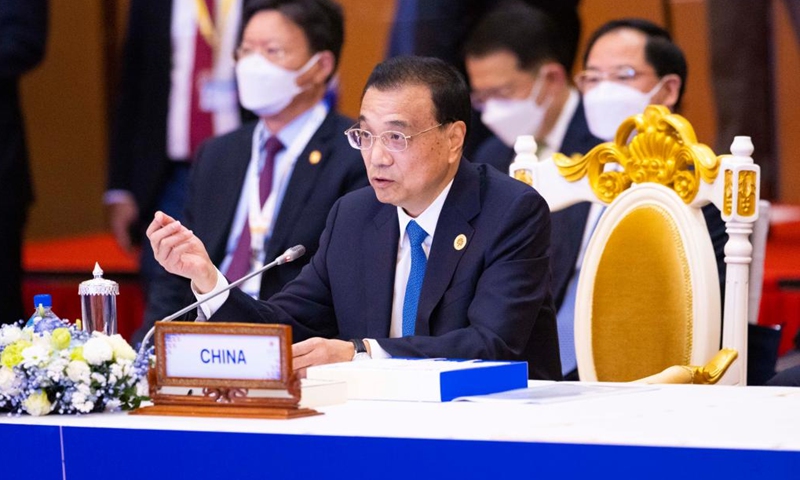China is willing to work with the various parties in the ASEAN Plus Three (APT) to continue to build consensus and deepen pragmatic cooperation for a bright future of East Asia, Chinese Premier Li Keqiang said on Saturday when attending the ASEAN, China, Japan and South Korea Summit.
The meeting, chaired by Cambodian Prime Minister Samdech Techo Hun Sen, was also attended by leaders of two other ASEAN member states, South Korean President Yoon Suk-yeol and Japanese Prime Minister Fumio Kishida.
On Friday, Li attended the Summit in Phnom Penh, during which a joint statement on China-ASEAN cooperation has been released.
Noting that East Asia is an important driver for global growth, Li said the APT Summit is a major mechanism for East Asia cooperation.
Since being launched 25 years ago, the APT cooperation, thanks to peace and stability in the region, has promoted their own national socio-economic development, safeguarded regional financial and food security and maintained the stability and free flow of international industrial and supply chains, he said.
The COVID-19 pandemic prevention and control has achieved initial victory. East Asia’s economy has recovered from the shock, and the restart of tourism and accelerated development of the digital economy have brought great benefits. On the other hand, the international security situation is unstable, unilateralism and protectionism, economic and financial risks are on the rise, and global development is facing unprecedented challenges.
Li made five proposals regarding the APT mechanism.
First, they should keep the process of regional economic integration going. Economic integration is an important driving force for development and prosperity in East Asia. It also meets the development needs of all countries.
As a free trade area with the largest population, the most diverse membership and the greatest potential in the world, the Regional Comprehensive Economic Partnership’s (RCEP’s) entry into force is an important milestone in East Asia’s economic integration process. The countries should promote the full effectiveness and implementation of the RCEP and release the maximum dividends of the free trade agreement, Li said.
Second, they should maintain the stability of industrial and supply chains. “Building walls and barriers” and “decoupling” chains run counter to economic laws and market principles. They are fundamentally unworkable. Frictions in the international trade and economic field are inevitable. As long as we view them rationally and handle them fairly, fairly and properly, we can achieve win-win results, Li said.
To achieve high-quality development in East Asia, countries involved must continue to foster an open and innovative environment and build a more cohesive and resilient regional industrial system. Based on the support of APT small and medium enterprises service alliance, they should help regional enterprises enhance innovation and digitization capacity, and create more job opportunities.
Third, they should improve crisis response capacity. In the face of the current multiple crises, including the epidemic, food, energy and financial crises, the countries need to make good use of the APT crisis response mechanism to maintain overall stability in the region. Li said China supports building an APT storage center of emergency medical supplies and an APT rice emergency storage mechanism, promoting the effectiveness of the Chiang Mai Initiative Multilateralization, and constantly improving the regional financial security network.
Fourth, they should deepen cultural, and people-to-people exchanges. Li said China is willing to take the launch of the ASEAN Directors-General of Immigration Departments and Heads of Consular Affairs Divisions of the Ministries of Foreign Affairs Plus Three Consultation mechanism as an opportunity to provide more policy support to facilitate personnel movement.
China is willing to optimize epidemic prevention and control measures according to changes in the COVID-19 pandemic situation, gradually increase international flights and proactively facilitate the return of ASEAN, Japanese and South Korean students to resume their studies in China.
Fifth, they should work to enable sustainable development. Sustainable development fully embodies the concept of people-centered development, Li stressed. It is an inherent requirement for harmonious coexistence between man and nature, and it is also the common aspiration of people in East Asia.
China is willing to carry out cooperation on the Global Development Initiative with all parties, take lead in conducting APT transition finance research and holding APT clean energy roundtables, and continuously deepen the low carbon partnership, he said.
China has historically solved the problem of absolute poverty and China is ready to share our experience in poverty reduction with other countries in the region. China will continue to advance the projects under the East Asian Cooperation Initiative on Poverty Reduction, improving the regional poverty alleviation.
China’s economy is already deeply integrated into the world, and China will stick to the basic national policy of opening-up, Li said, adding that China will further protect the rights and interests of foreign investors, and foster a market-oriented, law-based and world-class business environment. China’s high-quality development and opening-up will bring new and greater development opportunities to other countries.
In the past decade, China has initiated more than 130 cooperative proposals or projects under the APT cooperation framework, most of which had been implemented thanks to the joint efforts of related parties. The APT cooperation has gone through twists and turns, and the hard-won achievements should be cherished with greater care, Li said.
China is willing to work with the various parties in the APT to continue to build consensus and deepen pragmatic cooperation for a bright future of East Asian cooperation, Li said.
(Global Times)




